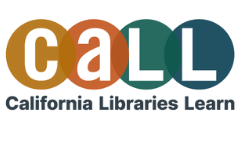California library workers are invited to a no-cost training about co-design that will help libraries engage with their communities AND craft stronger services and grant proposals. If you want to find out about co-design, register to learn more at a 90-minute webinar, Exploring Co-Design: Fostering Inclusive Collaboration in Libraries, on Thursday, September 28 from 10-11:30 a.m. (The webinar will also be recorded and made available at CALL Academy.)
But what is co-design? Simply said, co-design incorporates community engagement into your work. Training in co-design helps libraries plan with communities, instead of for communities, and use a “nothing about us, without us” mindset, where community member voices are an active part of the planning and implementation process. Co-design’s not an add-on; it’s a way of thinking based in equity.
Why is this training timely? The California State Library’s five-year plan aims to promote equity in services and programming. For example, Goal 1 of the LSTA plan is to “Strengthen the ability of California libraries to design equitable programs and services in collaboration with their local communities.” A success indicator for this goal is that co-design be embedded in the creation of programs and services.
Co-design and equity are fundamental parts of the State Library’s grantmaking process. Here’s one of the questions you’ll answer in the current LSTA Inspiration Grant 2023-2024 application and in future LSTA 2024-2025 applications, opening in early 2024. “Describe how your project has been designed and will be implemented in collaboration with the marginalized community(ies) on which your project will focus and other members of your community.” Specifically, the application instructions explain: “Provide information about how you will: include co-design activities for library staff and communities to learn about local marginalized populations and develop a shared understanding and language of equity principles and practices; engage staff in professional development activities that integrate equity-centered learning with practice; include new or expanded partnerships and collaborations in which libraries engage with community stakeholders and groups from targeted populations; engage staff in understanding barriers to service for and with marginalized populations and in implementing strategies to remove barriers. Note: The State Library understands that this section of the application requests information and activities that may be new or unfamiliar to some applicants. Respond to the best of your abilities and reach out to State Library staff with any questions. Applicants’ responses will determine the level of support that grantees will need from the State Library if a project is funded. Responses will not determine whether or not a project is funded.”
Open opportunities that refer to co-design include LSTA Inspiration Grants, which close November 30, 2023 at 12:00 noon, or once all available funds have been awarded. Inspiration Grants provide Library Services and Technology Act (LSTA) funding for California libraries that are inspired to implement projects outside of the State Library’s other funding opportunities. Inspiration Grants provide funding for projects that may not fit within the bounds of the other grants offered by the State Library and/or for ideas that are generated outside of other funding opportunity application timeframes. If you have an idea or project you’ve been waiting to implement that addresses community needs and aligns with community aspirations; supports improvement, innovation, and experimentation in library services; and can be completed by June 30, 2023, you’ll definitely want to learn more about co-design as soon as you can!
You’ll want to refer to the full application for questions and definitions, but here’s the definition of co-design used: The process of designing programs and services together with community members, instead of making decisions for community members. Co-design enables library workers to build strong relationships with the community and empowers community members to take a lead in the design and implementation of library programs and services. Co-design democratizes the design of services by equalizing the power dynamics between multiple community assets, making everyone partners in the design of programs and services. Inviting a group of teens to be part of a library’s Teen Advisory Board to co-develop, co-plan and co-implement library programs for teens in that community is an example of co-design. (Adapted from the “Our Philosophy” page of the VRtality website: https://www.vrtality.org/about/our-philosophy/.)

